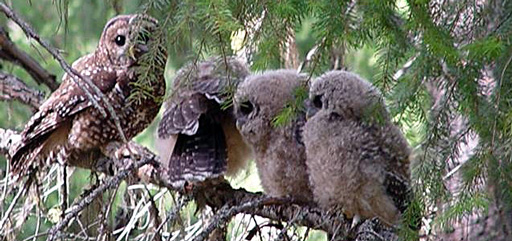PORTLAND, Ore. (KOIN) — The Portland Audubon Society is denouncing the federal government’s proposed reduction of northern spotted owl critical habitat, something Conservation Director Bob Sallinger called a flagrantly illegal assault on environmental laws. Earlier this week, Sallinger celebrated a separate conservation win for migratory bird protections in a recent federal court decision.
U.S. Fish and Wildlife Service announced Monday they are seeking public comment for a proposal to reduce the critical habitat of the northern spotted owl, listed as threatened under the Endangered Species Act (ESA), by 204,653 acres (or 2%) of the 9.6 million acres that were designated for the owl in 2012 in California, Oregon and Washington.

“The proposed exclusions will allow fuels management and sustainable timber harvesting to move forward while supporting the recovery of the northern spotted owl,” said Robyn Thorson, USFWS’s Regional Director for the Columbia-Pacific Northwest, in a press release. “To strike this balance, the Service employed the best available science and worked closely with federal, state and tribal partners to evaluate needed exclusions, meet our legal obligations and update management plans.”
Proposed exclusions are being prepared “under a section of the ESA that allows the Secretary of the Interior to exclude certain areas from critical habitat for economic, national security or other relevant factors so long as such exclusion does not cause the species to go extinct,” the press release said.
The Audobon Society’s Sallinger told KOIN 6 News the northern spotted owl is “very deeply imperiled as they continue to move toward extinction.”
“The Trump administration’s decision to reduce habitat protections is an absolute disgrace,” Sallinger said. “This is the most comprehensive assault on our environmental protections that we’ve ever seen. And it’s being done entirely at the behest of big industry. This kind of decision puts the spotted owl even closer to extinction.”
The proposed exclusions are located in 15 Oregon counties from which 184,476 acres are on Bureau of Land Management-administered lands. Approximately 20,000 acres of tribal lands are also being proposed for exclusion.
“It’s a classic case of sue and settle, where government uses a lawsuit as an excuse to gut environmental laws rather than protecting them.”
Portland Audobon Society Conservation Director Bob Sallinger
The critical habitat revision proposal is part of a settlement agreement with labor representatives, the timber industry and several counties that brought a legal challenge against the 2012 critical habitat designation, U.S. Fish and Wildlife Service’s press release said. Under the settlement, the Service agreed to submit a revised critical habitat rule that identifies proposed exclusions.

Sallinger’s response: “It’s a classic case of sue and settle, where government uses a lawsuit as an excuse to gut environmental laws rather than protecting them.”
“The science is clear: These protections absolutely need to be in place. In fact, the protections need to be made stronger. To go this direction is to increase the likelihood that the spotted owl will go extinct,” he said.
The proposal published in the Federal Register Tuesday, opening a 60-day public comment period, for which instructions are located here. USFWS said it is seeking public comment on whether additional exclusions should be evaluated.
Sallinger said the northern spotted owl critical habitat reduction is expected to bring litigation: “We’ll use whatever means are available to challenge it.”
He said he’s hopeful the proposed reduction of critical habitat for northern spotted owls won’t “stand the test of time.”
On Tuesday, Sallinger said there was a “huge, huge victory for migratory birds” when a federal court in South Carolina decided to strike down the Trump Administration’s attempt to reverse a century of bird protection by eliminating “incidental take” provisions of the Migratory Bird Treaty Act of 1918. The provisions allow federal government to hold industry accountable when they kill protected bird species, according to Portland Audubon society.
“The Trump administration basically was attempting to give industries that kill birds a free ride. And the federal courts […] rule[d] that that opinion the Trump administration put out was illegal,” Sallinger said.
The lawsuit against Trump administration’s opinion on MBTA was brought by National Audubon, American Bird Conservancy, several other conservation groups and several states, including Oregon.
